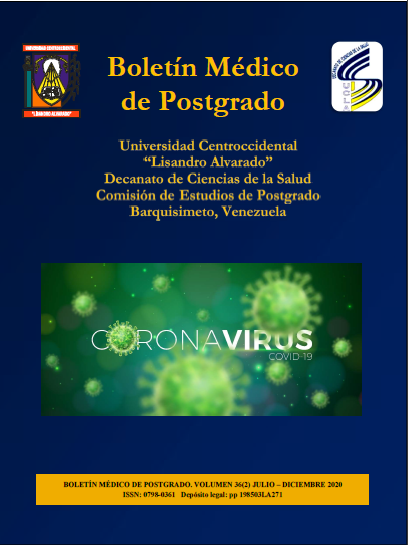Clinical features of patients with suspected tumor lysis syndrome. Servicio de Medicina Interna. Hospital General Universitario Dr. Luis Gómez López
Keywords:
tumors, cancer, metabolism, renal insufficiency, hyperkalemiaAbstract
Tumor lysis syndrome (TLS) is a potentially lethal complication due to massive release of nucleic acids, potassium and phosphate into the systemic circulation which is associated with severe hydroelectrolitic metabolic disorders. A retrospective review of clinical charts was performed in order to describe clinical characteristics of patients with possible TLS that were admitted to the Servicio de Medicina Interna of the Hospital General Universitario Dr. Luis Gómez López during the period 2017-2018. The results show that 50% of patients were between 51 and 70 years old and 65% were female. Breast cancer (29%), stomach cancer (15%) and Non-Hodgkin lymphoma (12%) were more frequent in patients with possible TLS. All patients showed at least three of the clinical features commonly associated with TLS such as nausea, vomiting, anorexia, weakness, cramps, hyperreflexia, oliguria, anuria, hematuria, hypotension, convulsion and dehydration. 46% of patients had hyperkalemia, 36% hypocalcemia and 18% hyperphosphatemia. Creatinine levels > 1,4 mg/dl were seen in 76% of patients. Definitive diagnosis of TLS was not possible in any of the patients included in this study due to the lack of laboratory studies required according to international guidelines.
Downloads
References
Burghi G, Berrutti D, Manzanares W. Síndrome de lisis tumoral en terapia intensiva: encare diagnóstico y terapéutico. Medicina Intensiva 2011; 35(3): 170-178.
Scott C, Jones D, Ching-Hon P. The tumor lysis syndrome. N Engl J Med 2011; 364: 1844-1854.
Tiu R, Mountantonakis S, Dunbar A, Schreiber M. Tumor lysis syndrome. Semin Thromb Hemost 2007; 33: 397-407.
Salit R, Bishop M.The evolving world of tumor lysis syndrome. How we treat tumor lysis syndrome. Oncology 2011; 369-337.
Darmon M, Vincent F, Camous L, Canet E, Bonmati C, Braun T, et al. Tumour lysis syndrome and acute kidney injury in high-risk haematology patients in the rasburicase era. A prospective multicentre study from the Groupe de Recherche en Réanimation Respiratoire et Onco-Hématologique. British Journal of Haematology 2013; 162(4):489-97.
Caravaca F, Martínez O, Pampa S, Olmedo M, Gomis A, Garrido P. Síndrome de lisis tumoral en neoplasias sólidas: características clínicas y pronóstico. Medicina Crítica 2016; 146(3): 121-124.
Usami E, Kimura M, Iwai M, Teramachi H, Yoshimura T. Analysis of the incidence of tumor lysis syndrome in patients with hematological malignancies treated with rasburicase. Mol Clin Oncol 2017; 6(6): 955-959.
Coiffier B, Altman A, Pui Ch, Yones A, Cairo M. Guidelines for the management of pediatric and adult tumor lysis syndrome: an evidence-based review. J Clin Oncol 2008; 26(16): 2767-2778.
Published
How to Cite
Issue
Section
Las opiniones expresadas por los autores no necesariamente reflejan la postura del editor de la publicación ni de la UCLA. Se autoriza la reproducción total o parcial de los textos aquí publicados, siempre y cuando se cite la fuente completa y la dirección electrónica de esta revista. Los autores(as) tienen el derecho de utilizar sus artículos para cualquier propósito siempre y cuando se realice sin fines de lucro. Los autores(as) pueden publicar en internet o cualquier otro medio la versión final aprobada de su trabajo, luego que esta ha sido publicada en esta revista.



